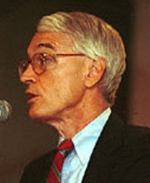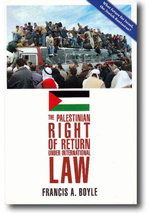Palestinian statehood is within reach
By FinalCall.com News | Last updated: Dec 8, 2011 - 12:43:23 PMWhat's your opinion on this article?
One-on-One with author, professor and international law expert Dr. Francis A. Boyle
Dr. Francis A. Boyle is a scholar in the areas of international law and human rights. He has written and lectured extensively in the United States and abroad on the relationship between international law and politics especially relating to the Palestinian struggle for statehood. Currently Professor Boyle lectures on international law at the University of Illinois College of Law. While in Rosemont, Illinois recently for a panel discussion and book signing at the American Muslims for Palestine conference, Dr. Boyle spoke with The Final Call’s Ashahed M. Muhammad.

Ashahed M. Muhammad (The Final Call Newspaper:) I enjoyed the forum as well as the panel discussion that followed. What is the most important thing you think the people should come away with leaving this conference after listening to your words relating to Palestinian statehood?
Dr. Francis Boyle (FB:) There are many issues that I could have talked about because it’s so complex, but the matter of fact is we need to let the Palestinian leadership in Ramallah know that we want them to go for full-fledged United Nations membership despite the enormous pressure that is being put on them by the Americans, the British, the Canadians, the so-called Quartet in the United Nations—that they have to do this. I think if all the supporters weigh in with Ramallah, with (Palestinian Authority) President (Mahmoud) Abbas with the PLO Executive Committee, hopefully they’ll do it. There are no legal obstacles to their membership. The votes are there in the UN General Assembly and President Abbas just needs to take the next step.

FCN: So with the overwhelmingly supportive UNESCO vote recently with only a few abstentions and the number of nations who voted against only in the teens, you think that portends heavily in favor of official recognition.
|
Understanding the ‘Right of Return’
Q. Who are the Palestinian refugees? A. Palestinian refugees are the indigenous inhabitants of Palestine, the majority of whom were dispossessed, were forced to run away or were expelled when the state of Israel was created in 1948. This dispossession and expulsion has continued since with the second largest such event in Palestine taking place during the 1967 war, which Israel launched on its Arab neighbors and which resulted in the occupation of the Gaza Strip and the West Bank. Palestinian refugees generally fall into three main groups: Palestinian refugees displaced in 1948, internally displaced Palestinians who remained within the areas that became the state of Israel, and Palestinian refugees displaced in 1967 from the West Bank and Gaza Strip. For the past 63 years, Israel has continued to deny Palestinian refugees their right to return to their ancenstral towns, villages and homes.
Q. How did the Palestinian refugee problem arise? A. The Palestinian refugee problem arose from a systematic policy of ethnic dispossession and elimination, the results of which are apparent in the Palestinian refugee camps and in the Palestinian Shatat (exile). These policies continue to this day. Zionist policy sought to create an exclusive homeland for Jews in Palestine, a region that already had an indigenous population with a history stretching back thousands of years. The characterization of Palestine as “a land without a people for a people without a land” was a myth created to suggest that Palestine was waiting to be populated. Nothing was further from the truth and this has been evidenced by the atrocities of 1948 and since.
(Source: Al Awda: The Palestinian Right to Return Coalition) |
FB: Right. If this UNESCO vote was a test vote by the Palestinian leadership to see how many votes they’d get in the General Assembly and they need two-thirds to vote in the General Assembly not counting abstentions, no shows or ‘no’ votes. So if you look at the UNESCO vote they had two-thirds of those states voting either yes or no. So clearly the votes are there in the General Assembly. So it really—now—I’ve done all I can as a lawyer to set this thing up. Where we’re really now is (we need) people to say to President Abbas and the PLO Executive Committee—ignore the Americans, ignore the British, ignore their flunky Ban Ki-moon and go for that full UN membership and then we can launch and wage a legal intifada against Israel all over the world. That’s the most important message.
FCN: Tell us a bit about the book ‘The Palestinian Right of Return Under International Law’ and why you wrote it?
FB: I wrote it because when it was announced the peace negotiations were opening again—the new round—I knew at the heart of these negotiations would be the ‘Right of Return.’ I also knew that again, the usual culprits the British, the Americans, the UN, would put enormous pressure on the Palestinians to compromise on the ‘Right of Return.’ So I wanted to write a book that would provide counter pressure and counter information so that all Palestinians could understand the legal, political and diplomatic basis to the ‘Right of Return.’ So that’s why I wrote the book the way I did.
FCN: Any final words or thoughts you’d like to add?
FB: I just want to express my best personal regards to Minister Louis Farrakhan and all at the Nation of Islam. We’ll be having a convention—an organization that I work with in Chicago—I think in late April where I’ll be lecturing on African-American’s right of self-determination so, maybe Minister Farrakhan would be so kind as to come. It will be at East-West University in April.
FCN: Thank you.
INSIDE STORIES AND REVIEWS
-
-
About Harriett ... and the Negro Hollywood Road Show
By Rabiah Muhammad, Guest Columnist » Full Story -
Skepticism greets Jay-Z, NFL talk of inspiring change
By Bryan 18X Crawford and Richard B. Muhammad The Final Call Newspaper @TheFinalCall » Full Story -
The painful problem of Black girls and suicide
By Charlene Muhammad -National Correspondent- » Full Story -
Exploitation of Innocence - Report: Perceptions, policies hurting Black girls
By Charlene Muhammad -National Correspondent- » Full Story -
Big Ballin: Big ideas fuel a father’s Big Baller Brand and brash business sense
By Bryan Crawford -Contributing Writer- » Full Story






 Click Here Stay Connected!
Click Here Stay Connected!








